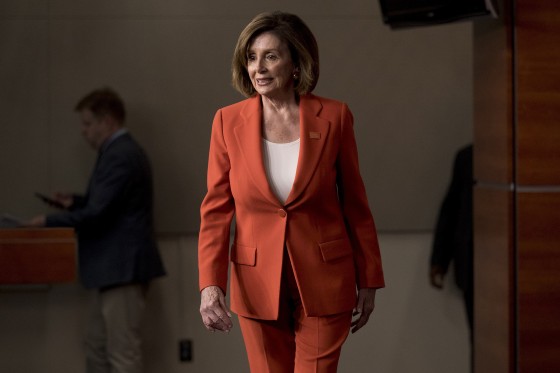WASHINGTON — The House approved a resolution Tuesday to authorize the House Judiciary Committee and other panels to go to court to enforce their subpoenas of the Trump administration.
The measure, which was adopted 229-191 along party lines, allows the Judiciary Committee to sue Attorney General William Barr and former White House counsel Don McGahn for refusing to comply with its subpoenas related to former special counsel Robert Mueller’s report on Russia's efforts to influence the 2016 election and possible obstruction of justice by President Donald Trump.
Democrats on the Judiciary Committee have been seeking the unredacted version of Mueller’s report and underlying evidence from Barr, as well as documents and testimony from McGahn, a key figure in the report.
The resolution also reaffirms that other committee chairs, with the approval of a bipartisan group of House leaders and assistance of the House general counsel, can take civil legal action to enforce their subpoenas without having to hold votes in committee or on the House floor.
The panel voted in May to advance a measure to hold Barr in contempt of Congress, but Chairman Jerry Nadler, D-N.Y., said Monday that he would hold off on that threat for now after he reached an agreement with the Justice Department to obtain some underlying evidence from the Mueller report related to possible obstruction of justice by Trump.
GOP leaders criticized their Democratic counterparts Tuesday for proceeding with the vote on the resolution.
“You're seeing on the floor again this week Speaker [Nancy] Pelosi wasting her majority on presidential harassment rather than focusing on the priorities of the American people,” House Minority Whip Steve Scalise, R-La., said at a news conference.
Democrats have issued more than two dozen subpoenas this year targeting the Trump administration. Administration officials again defied Democrats’ subpoena power late last week when Barr and Commerce Secretary Wilbur Ross failed to produce documents to the House Oversight and Reform Committee on the planned addition of a citizenship question to the 2020 census.
Download the NBC News app for breaking news and politics
The oversight panel is scheduled to hold a vote Wednesday on whether to hold Barr and Ross in contempt of Congress.
In a letter to Oversight Chairman Elijah Cummings, D-Md., on Tuesday, Assistant Attorney General Stephen Boyd said the administration has cooperated extensively with the committee, but the Justice Department would advise Trump to assert executive privilege over some of the subpoenaed documents if lawmakers proceed with the contempt vote.
The votes on the floor and in committee are part of the Democrats’ larger oversight strategy, which they are ramping up this week. The Judiciary Committee held the first in a series of hearings on the Mueller report Monday and the House Intelligence Committee is holding a rare open hearing Wednesday on the counterintelligence implications of the former special counsel's findings.
Following the vote, several committee chairs spoke to reporters about Democrats’ investigative plans.
“We will move forward with holding this president accountable to the American people,” Nadler said. “We will move as quickly as possible to go to court against Don McGahn, the president’s former counsel, and any subsequent witnesses who disobey a committee subpoena.”
Nadler added, “We must be clear: No one is above the law and no one is exempt from congressional subpoenas.”
Cummings said the vote "marks a pivotal moment for Congress in our ability to conduct oversight as an independent branch of government.”
The White House, Cummings said, has “not turned over one single shred of paper in response to any of our requests” about such things as the response to Hurricane Maria in Puerto Rico, security clearance concerns, efforts to transfer nuclear technology to Saudi Arabia and hush money payments that the president's former longtime lawyer, Michael Cohen, made to women who allege past affairs with Trump, which he has denied.
House Intelligence Committee Chairman Adam Schiff, D-Calif., said the House vote was not ultimately just about "Donald Trump or Donald Trump alone. Ultimately this is a fight over whether any Congress can oversee any president.”
The vote on Tuesday came as a quarter of House Democrats have voiced support for opening an impeachment inquiry against Trump, with many expressing frustration with the administration's refusal to comply with their subpoenas.
Pelosi, D-Calif., was asked at an event Tuesday about whether she thinks opening an impeachment inquiry would allow greater access to information.
“That’s a question to be asked — if you open an impeachment inquiry, do you get more information?” she said at the Peter G. Peterson Foundation 2019 Fiscal Summit. “I don’t have a straight answer on that, but even if you could, you can’t do it without going to the courts.”
When asked if she believes the president committed a crime, Pelosi said the Mueller report “clearly spells out at least 10 or 11 instances of obstruction of justice” by Trump, but she said “you must have the strongest possible case, iron-clad,” before pursuing impeachment.

